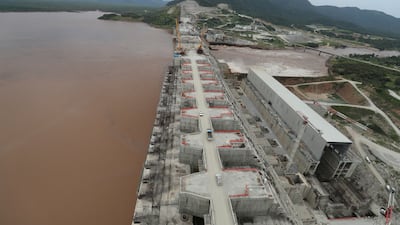Ethiopian Prime Minister Abiy Ahmed sought on Thursday to allay Egyptian and Sudanese fears over a hydroelectric dam Addis Ababa is building on the Nile, assuring the two downstream nations that they stood to benefit from the $5 billion project.
In a two-page statement, Mr Abiy listed the benefits of the Grand Ethiopian Renaissance Dam, or GERD, to his Horn of Africa nation, saying the power it will generate will transform the lives of 60 million people who now live without electricity.
The statement offered no real changes to Ethiopia’s long-standing position on the GERD nor did it make fresh proposals to break the stalemate in a decade of negotiations between the three countries over the dam.
However, its release comes days after regional news reports spoke of Ethiopia preparing for a third annual filling of the dam, which is located about 20 kilometres from the Sudanese border.
The Ethiopian leader wrote that the dam’s regulation of the flow of the Blue Nile would shield Sudan from water shortages, enable it to better run its own hydroelectric dams and spare it the destruction of floods.
He said Egypt would benefit from water conservation through the dam instead of losing billions of cubic metres of water to evaporation.
The dam, he added, would also prevent future “spillages” from overtopping Egypt’s Aswan dam.

Egypt and Sudan have for years been trying in vain to persuade Ethiopia to agree to a legally binding deal to govern the filling and operation of the GERD and to protocols to deal with future droughts.
Ethiopia has maintained that recommendations alone should suffice, declaring its handling of its resources a matter of national sovereignty.
The Blue Nile, whose source is on the Ethiopian highlands, accounts for about 85 per cent of the Nile's water. The remainder mostly comes from the White Nile, which originates in Central Africa.
The three countries last held a round of negotiations on the GERD in April last year, but talks broke down when Sudan and Egypt began trading acrimonious accusations with Ethiopia.
Egypt has long maintained that the dam, which is more than 80 per cent complete, could significantly reduce its share of the Nile’s water, wiping out hundreds of thousands of farming jobs and upsetting its delicate food balance.
Sudan says that without a deal with Ethiopia, the GERD could cause destructive flooding and disrupt the operation of its own power-generating dams.
“The … GERD is a good example that is demonstrative of the principle of co-operation,” My Abiy said.
“The dam … holds multiple benefits for the two downstream countries of Sudan and Egypt, as well as the East African region at large.
“It is time for our three countries of Ethiopia, Egypt and Sudan to nurture the narrative towards building peace, co-operation, mutual coexistence and development of all our people without harming one another.”
Ethiopia’s first two annual fillings were carried out without prior notification, causing Egypt and Sudan to vehemently protest against Addis Ababa’s “intransigence” and condemn its unilateral action.


